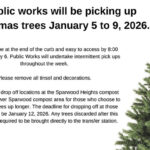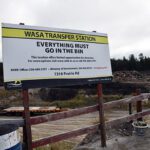Home »

On the vision of community-based park programs
Letter to the Editor
To those concerned for our community and parks:
These words are directed towards those who are interested in seeing interpretive programs permanently reinstated within British Colombia’s Provincial Parks. I currently am pursuing this goal with in the East Kootenay region acting as both a regional interpreter and Community Program Coordinator. The latter role is where this vision has formed. Our focus is on Moyie, Wasa, Kikomun and Mt Fernie Provincial Parks; but we also have a few at both Premier and Whiteswan.
It is the latter, which encompasses the spirit and vision of this proposal. Beginning this year in 2012, Kootenay Parks Services (private park operators), have expressed sincere interest and support towards incorporating community-based programs within the visitor schedule of our Provincial Parks. Eventually, a sole regional interpreter may be phased out in favor of a more sustainable community-based model. This model for the East Kootenay would have the litany of already existing community-based organizations and specialists welcomed to lead both environmental and cultural programs for all ages and demographics. The vision is to establish a networking organization that would provide travel and material experiences to those who lead programs throughout the region. I truly believe this collaborative mode holds the greatest sustainability and shared benefit for all residence and visitors.
A brief historical reflection will explain why I have been motivated in this direction. Currently, there are few areas within the province which are running programs. Ultimately the government of British Colombia was responsible for the interpretive programs within the park system. However, due to budgetary reasons, the programs had to be phased out. Currently, there are few parks throughout British Colombia, which are still running programs. Ultimately the budget is tight for most park operators, who are not mandated to initiate them. Both of these systems pose restrictions in the flexibility and inclusiveness which is now sought after. A tight budget necessitates creative thinking, and, looking to the future, I am suggesting that we can reinstate programs through regional collaboration while being cost efficient. Of course there will be logistical concerns to work out—of insurance and the quality of local programs, for example—but these stumbling blocks are not holes in the road, and, if you are indeed concerned with the quality of the provincial parks, it is essential to respond to this proposal seriously.
Now looking to the future, and though regional collaboration; we can reinstate programs while being cost efficient, and harnessing collaborative community initiative.
There may be a verity of approaches for raising a sustainable phoenix, but currently two possibilities have the greatest chance for both sustained longevity and continued bipartisan integration and inclusion. The first option would involve passing on community coordination to an existing non-profit organization that supports the return of interpretation and community-based programs within BC’s Parks. BC Nature Foundation is the one organization which may fit this roll. Examining our options more closely, one might say that there is potential for just nature-based programs within the parks, and that cultural programs should be included as well. In this light, perhaps a regional board could be formed to create, coordinated and encourage the regional inclusion of community-based programs within n Parks. Regardless of the methodology of implementation, I see the only needed wage being a regional community coordinator, who would build and maintain relationships, schedule and monitor programs, facilitate publicity as well as being the main liaison between parties. They would then be accountable to the East Kootenay Community Parks Society board of directors.
In speaking of the realities of funding, we need to look towards very creative and multilateral approaches. For instance, currently Kootenay Parks Services is the main funder for these programs within the region. Park operators do have a vested interest in visitor experience to enhance camper loyalty and experience; the fanatical and planning burden should not rest on their shoulders alone, especially as the benefit will be spread throughout many hands.
As these programs are in BC’s Provincial Parks, some may hark for more funding to come from the province itself. Notably, there has been a centennial grant supporting this very concept, and if proven there may be internal and political support for annual community-based funding. Additionally, a non-profit organization is usually in an advantageous position to apply for grants. Further options can be sourced through community patron donations and fundraisers. Indeed, no source should be the sole funder as a house with many pillars will enviably stand longer than a stool with one. These funds will ultimately support both the wages of the community coordinator and the well-deserved honorariums which recognize those community members and organizations who give their time to plan and lead programs. These honorariums will represent both travel cost and time and may be either uniformly distributed or decided upon a case by case scenario. If this model is implemented, I feel recompense priority should be given to those who have a lack of paid staff or who operate under low budgets; though the schedule should remain open to all those who align with the spirit of community-based collaborative programming in BC’s Parks.
Let’s imagine the potential of fully implanting this model. Our parks could once again become more than camp grounds or protected areas. Our parks could be a gathering place for new Ideas, where different generations share and build connections and where education, exploration and cultural inclusion are fostered in our community Parks. Our parks could be the places where a photography club meets, hiking clubs, musicians – places where cutting edge environmental education ideas from land-use planning to paradigm shifts are taught. They could be places where cultural barriers are challenged and many cultural perspectives are welcome. Our parks could be places where both visitors and locals alike could grow, learn and build stronger connections between themselves, our landscapes.
Let us remember that all regions within B.C. have many strong community organizations and volunteers. It is not for the lack of interest and potential that this model is not already existing; but simply as a coordinating body as yet to be formed. Our organization, Kootenay Parks Services, has already begun the process of networking and incorporating community into parks. For instance, Kootenay Orienteering Club, The Ideal Society, Wildsight, Go-fish BC and Nature Bob; are some of the existing partnerships that are already incorporated into our 2012 schedule. In this further, relationships may be Wild voices, Ktunaxa Nation, St. Mary’s fly Club and even Kimberly summer theater. Even in a relatively small region, there is still much opportunity to help revive interpretation and community based-programs in BC’s Provincial Parks.
Now let us go beyond these words and create a community plan for action. In this letter I call all those first within the East Kootenay interested in forming a regional community-based park programs with In the east Kootenay to attend the first consultation meeting at Kootenay Parks services head office in Wasa Lake at 6 p.m. on Monday, September 3.
Remember, we could be part of a model which, if proven could transform Province-wide.
Ian A.R. McCubbin,
Kootenay Parks Services
Community Program Coordinator/ Regional Interpreter







